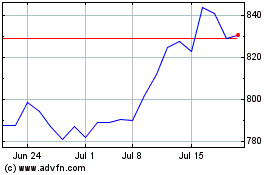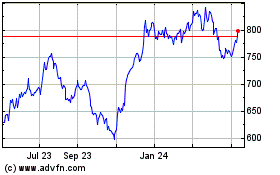BlackRock Profit Jumps on Broader Pandemic Recovery -- Update
April 15 2021 - 9:50AM
Dow Jones News
By Dawn Lim
BlackRock Inc.'s quarterly profit rose 49% as the giant asset
manager benefited from surging markets and investors' willingness
to bet on an economic recovery.
The money manager posted a first-quarter profit of $1.2 billion,
or $7.77 a share, up from $806 million, or $5.15 a share, a year
earlier. BlackRock's revenue rose 19% to $4.4 billion from $3.7
billion in the year ago period when panicked investors fled to cash
while a pandemic rippled through the globe.
The firm's adjusted per-share profit of $7.77 slightly beat
analyst's expectations.
The world's largest money manager scaled a new milestone, with
assets under management rising to $9 trillion.
The firm's record inflows across all its strategies combined
showed investors are emboldened to make new market wagers -- even
in the face of an uneven economic recovery, the risk of inflation
and vaccine bottlenecks that threaten to prolong a world-wide
pandemic.
In an interview, BlackRock Chief Executive Larry Fink said the
speed of vaccine rollouts will be the key to determining the speed
and breadth of an economic recovery.
"The broader issue is if the world is vaccinated much slower,
how can we open up the world again?" he said. "I do believe the
light is still close by, but it's just delayed."
The exchange-traded funds business BlackRock is best known for
-- a lineup of funds that trade on exchanges and track all kinds of
markets -- took in $68 billion in net flows in the first quarter.
That is a bigger haul than last year, when its iShares
exchange-traded funds attracted $13.8 billion in new money.
Banks, pension funds, hedge funds and traders often turn to
BlackRock's exchange-traded funds to get quick and broad exposure
to markets. New darlings such as Cathie Wood's ARK Investment
Management LLC are stealing the spotlight from entrenched firms.
Many index providers have slashed fees near zero and reached deeper
into niche corners of the market to stay relevant.
Mr. Fink's challenge is making sure that the firm stays ahead of
these and other rivals.
Across all strategies, BlackRock took in $171.6 billion in net
new money, up from roughly $35 billion in the year-ago quarter.
Central banks' efforts to keep interest rates low buoyed equities,
heated up pockets of the markets, and prompted investors to seek
higher-returning investments like private equity and other
alternatives.
Rising equity markets as well as money moving into more
lucrative, actively managed strategies boosted BlackRock's revenue.
The biggest chunk of revenue -- fees from managing investments and
administration fees -- rose 20%.
Rising markets helped to offset revenue BlackRock gave up to
undercut rivals on price. In addition, low interest rates have
challenged BlackRock's money-market funds. Yields of these funds, a
way for investors to park cash safely while earning some pocket
change, have plunged. BlackRock had to waive what it charges
investors to keep their yields from falling below zero for
investors this quarter, and expects to in the months going forward.
The firm's securities lending revenue also fell in the quarter.
After Mr. Fink helped usher in a revolution in ETFs, his next
big bet is riding on investors' interest in companies with higher
environmental, social and corporate governance rankings.
BlackRock already provides technology to help banks and
investors account for environmental risks and is aggressively
adding to ESG-themed funds. Technology-services revenue -- which
includes fees from the firm's software suite known as Aladdin --
rose by 12%.
BlackRock recently cut a deal with a group of banks to link its
own corporate lending costs more closely to achieving goals such as
women in senior leadership and boosting assets in
sustainability-themed funds. The move signaled to Wall Street
BlackRock's view that it is possible to measure the financial
consequences of environmental or workplace goals.
BlackRock's push to brand itself as an advocate of environmental
disclosure from companies dovetails with the Biden administration's
plans to be more vigilant about monitoring risks to financial
stability posed by climate change.
As of Wednesday, BlackRock shares have increased about 150% on a
total return basis since their last low on March 23 last year, when
markets lurched from the pandemic. The Federal Reserve's
interventions calmed markets and placed a BlackRock advisory unit
in the high-profile role of assisting the central bank in
bond-buying programs.
Write to Dawn Lim at dawn.lim@wsj.com
(END) Dow Jones Newswires
April 15, 2021 09:35 ET (13:35 GMT)
Copyright (c) 2021 Dow Jones & Company, Inc.
BlackRock (NYSE:BLK)
Historical Stock Chart
From Mar 2024 to Apr 2024

BlackRock (NYSE:BLK)
Historical Stock Chart
From Apr 2023 to Apr 2024
